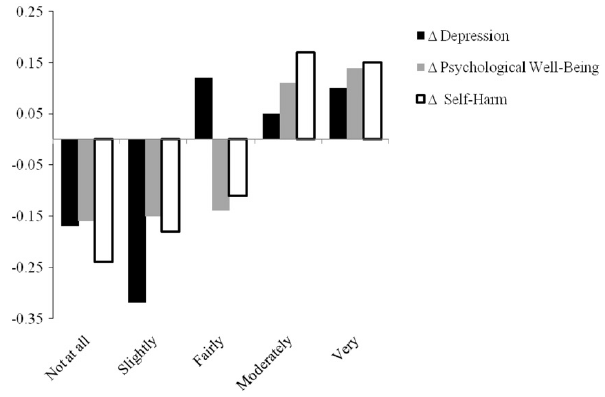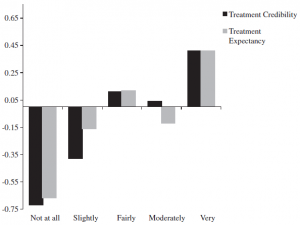David Rosmarin and colleagues from Harvard Medical School wanted to know if psychiatric patients who believe in God have better treatment outcomes (Previously, Rosmarin found that religious Jews trained to put more trust in God also improved psychologically).
So they studied 159 patients who were a day-treatment program at an academic psychiatric hospital, to see which ones got better. They were mostly (60%) suffering from major depression, athough 12% had bipolar disorder. The remainder had a variety of other primary diagnoses (e.g., anxiety disorders).
Across a range of measures, those who got better tended to be those who were more religious to start with. They reported greater reduction in depression, improvement in psychological well being, and less self harm.
But what was interesting was that those who were more religious to start with also had more faith in their treatment.
So, prior to treatment starting, the more religious were more likely to think that the treatment would make them better, and more likely to recommend the treatment to a friend (if that friend had a similar psychological problem). That’s before they had had the treatment!
What’s even more intriguing is that, when they analysed the data, they found that belief in the credibility of the treatment seemed to explain the improvements, at least among the depressive patients. Other factors, like congregational support, did not.
Here’s what they conclude:
… our results suggest that belief in the credibility of psychiatric treatment and increased expectations to gain from treatment might be mechanisms by which belief in God can impact treatment outcomes. It is also notable that faith in treatment was virtually not present in the absence of belief in God, and that few participants with high belief in God had low treatment credibility/expectancy.
This may suggest that faith is a general cognitive attribute representing an optimistic mental schema that can generalize to spiritual, medical and perhaps other domains as well. In this regard, patients can utilize faith (spiritual or otherwise) in an adaptive manner in a treatment context by supporting belief in treatment.
What they’re suggesting is that some are simply ‘faithful’ – i.e. they have a tendency to believe (in doctors, in preachers), and that faith is linked to optimism which, in turn, helps them to benefit from psychiatric treatment.
![]()
David H. Rosmarin, Joseph S. Bigda-Peyton, Sarah J. Kertz, Nasya Smith, Scott L. Rauch, & Throstur Bjorgvinsson (2013). A test of faith in God and treatment: The relationship of belief in God
to psychiatric treatment outcomes Journal of Affective Disorders, 146, 441-446 DOI: 10.1016/j.jad.2012.08.030
 This article by Tom Rees was first published on Epiphenom. It is licensed under Creative Commons.
This article by Tom Rees was first published on Epiphenom. It is licensed under Creative Commons.















